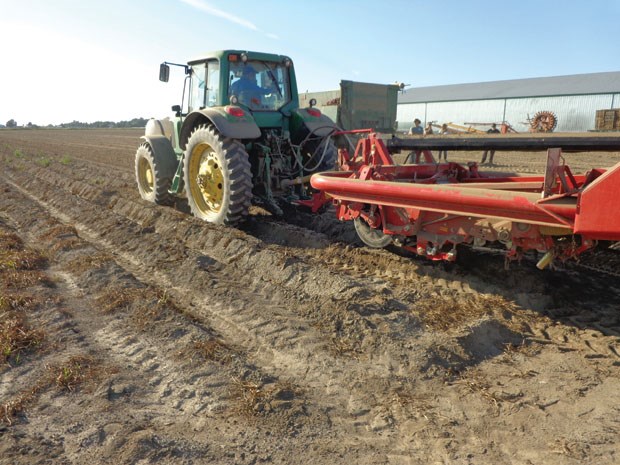Hot temperatures and low rainfall this year have resulted in low river flows across southern British Columbia. With the Fraser River running at only 60 to 65 per cent of its average flow, concerns are being raised about salt water getting into Delta's agricultural irrigation system.
"This year it's not just the dry weather, but also the hot weather through the spring that really shifted the timing of the flows on the Fraser," said Dave Campbell, head of the B.C. River Forecast Centre, adding that the river is about four weeks ahead of the seasonal average. "Flows like this are in the fourth percentile, or a one in 100 year event."
Climate models predict that hot, dry weather patterns will become more common, with average temperatures increasing by 1.7 degrees by 2050, along with decreasing summer rainfall, a combination that is raising concern with Delta's farmers.
Despite being surrounded by water, Delta farmers are dependent on irrigation to grow their crops. Fresh water is drawn from the Fraser River and fills a network of irrigation ditches before being used on the fields. Salt water has always flowed up the river at high tide, but with climate models predicting lower volumes of water flowing downstream, and rising sea levels, the "salt wedge" is pushing further up river and mixing with
fresh water as it flows back to the ocean.
"As farmers, we're concerned about the long-term future of our land, and our work is focusing more and more on salinity," said Bruce May who chairs the Delta Farmers' Institute's (DFI) committee on irrigation and salinity. "We have ample water, but we need to ensure that the water stays clean."
When salt accumulates in the soil, it is known as salinization. If salt levels in the soil get too high, the land will be lost to food production. It's a process that is difficult, if not impossible, to reverse.
Arising from the construction of the South
Fraser Perimeter Road, the provincial government invested more than $22 million in Delta's irrigation. The Delta Irrigation Enhancement Project has upgraded the water distribution system, including a new irrigation intake at 80th Street to reduce saltwater issues. Salinity monitors automatically shut off the intakes for irrigation water when salt levels rise.
"This year the lower river flows during the spring freshet delayed opening of the irrigation intakes. We weren't able to open the Ladner intake until mid-June, and had to shut it down in mid-July about three to four weeks earlier than normal," said Hugh Fraser, Deputy Director of Engineering at the Corporation of Delta, who manages the team responsible for monitoring and maintaining the system. "The new irrigation water intake and irrigation system has been operational since May. As of mid-July we are still getting good quality water into the system from the new intake, however this may change as river flows continue to drop."
In addition to his work with the DFI, May grows cranberries at CranWest Farms, a crop with a very low tolerance for salinity.
"Cranberry growers need to draw water in spring time to fill up our reservoirs for frost protection. There's typically enough from rainfall and runoff that we don't rely on the river," explained May. "We need a great deal of water in the fall for harvest, and much of that comes through the irrigation system."
Over the years, he has experienced growing issues with the quality and quantity of irrigation water due to saltwater contamination.
"By the end of the summer there is a limited supply of fresh water in the irrigation system. Right now we get enough water to meet our needs, but if the oceans rise, the Massey tunnel is removed and they dredge deeper, we may lose that," he adds.
Farmers can change to crops like blueberries and potatoes, that are more tolerant of salty soil, and invest in better drainage to allow winter rains to help flush the salts out, but the focus for Delta's farm community is to prevent salinization in the first place. In partnership with the B.C. Agriculture Food Climate Action Initiative, the Delta Farmers' Institute is developing a salinity benchmarking study for the Fraser River. They are actively seeking support from other groups impacted by development on the river to assist with a modelling study that will help planners and water users understand the possible impacts of seasonal and year-to-year changes to the year 2100.
The B.C. Agriculture Food Climate Action Initiative is a joint federal and provincial funded initiative to help BC's agriculture and food sectors develop tools and resources to adapt to climate change impacts. Working with local partners, CAI led the development of an adaptation plan for Delta agriculture and is now supporting implementation of a number of associated projects. "We're trying to build awareness and make sure that the people making these decisions are aware of the risk to agriculture," said May. "It's about defending the viability of our agricultural land, because if we can't get irrigation water, we won't be growing crops anymore, and that affects everybody."



